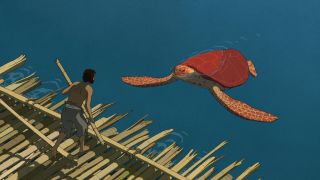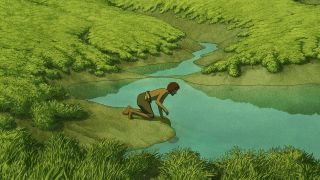GamesRadar+ Verdict
Dudok de Wit and Ghibli have birthed a pan-continental marvel: a fable-cum-fantasy of a life adrift, aching with tender beauty and awed by nature’s extremes.
Why you can trust GamesRadar+
Did the Oscar presenters double-check the envelope? With no disrespect to Zootropolis, this collaboration between Dutch animator Michael Dudok de Wit and resting-but-not-really Japanimation house Studio Ghibli was the real standout in 2017’s nominations for Best Animated Feature. And it’s also a stand-out in modern animation as a whole, with any echoes of Ghibli the work of a kindred, freethinking spirit rather than a studio-steered hired gun.
The studio/director pairing followed a singular pattern: impressed by Dudok de Wit’s Oscar-winning 2000 short Father and Daughter, Ghibli’s Isao Takahata and Toshio Suzuki gave him free rein, rather than pushing a ‘House of Totoro’ style.

Though Dudok de Wit shares Ghibli’s love of 2D animation, his clear-lined style is Euro-influenced – if his castaways had quiffs, they’d be doffed to Tintin’s Hergé. Any advice Ghibli did offer, though, proved wise: making the film wordless came from a Suzuki suggestion.
The resulting fable unfolds with the timeless resonance of myth. A man is washed up on a tropical island after a ferocious storm, where his attempts to escape on a makeshift raft are thwarted by an irascible, out-sized turtle. When the man finds the creature beached, he exacts revenge, turning it upside down and leaving it for dead.
Then something magical happens: after death comes a new beginning, the nature of which shouldn’t be spoiled, except to say that it pitches an entertaining survivalist fable into deep allegorical waters. What started as a strong, silent spin on Robinson Crusoe evolves into a profoundly philosophical meditation on fate, family and companionship, steered by the strange emergence of a red-haired woman.

Although some might find the contemplative shift a struggle, these island lives are never dull. Drama, dread and wonder course through this Dutchman’s take on nature, which rejects the anthropomorphic and prettified in favour of humbled respect and awe.
It’s almost alarming to see an animal film in which the critters don’t speak. The turtle is as unnerving as a bear in a Werner Herzog doc, while little crabs move in mysterious ways. And they’re pretty funny.
Climate and environment also present their own challenges. The sun isn’t just beautiful, it’s brutal. When clouds gather, they crowd in like a looming apocalypse. Deep swims through caves inspire swoons and terror. The leads seem dwarfed amid these vast land/sea-scapes, a sense encouraged by the director’s stress on long shots over close-ups.
This is not a world that can be owned or tamed, and adjusting to that fact is the test faced by the characters travelling through it. In the acceptance that nature’s enigmatic rhythms cannot be solved, only lived, an experimental film turns into a richly experiential one with a deep emotional core.
Bonds are formed, children born, years pass, and people who had to learn how to hold on must discover how to let go. No exposition is needed and the quiet eloquence of the allegorical arc is heartbreaking. The Red Turtle may play simple, but surrender to it and all of life seems to float in on its lapping currents and elemental tides.
Kevin Harley is a freelance journalist with bylines at Total Film, Radio Times, The List, and others, specializing in film and music coverage. He can most commonly be found writing movie reviews and previews at GamesRadar+.

Legend of Zelda: Tears of the Kingdom builder masterfully recreates the tank from 1996's Metal Slug to devastate Hyrule

Escape From Tarkov dev apologizes for paywalling PvE behind a $250 edition - will now open access to the mode in waves "for free"

Manor Lords archers are a little "ineffective" now because they were totally overpowered before: "This will surely take a while to get right"
